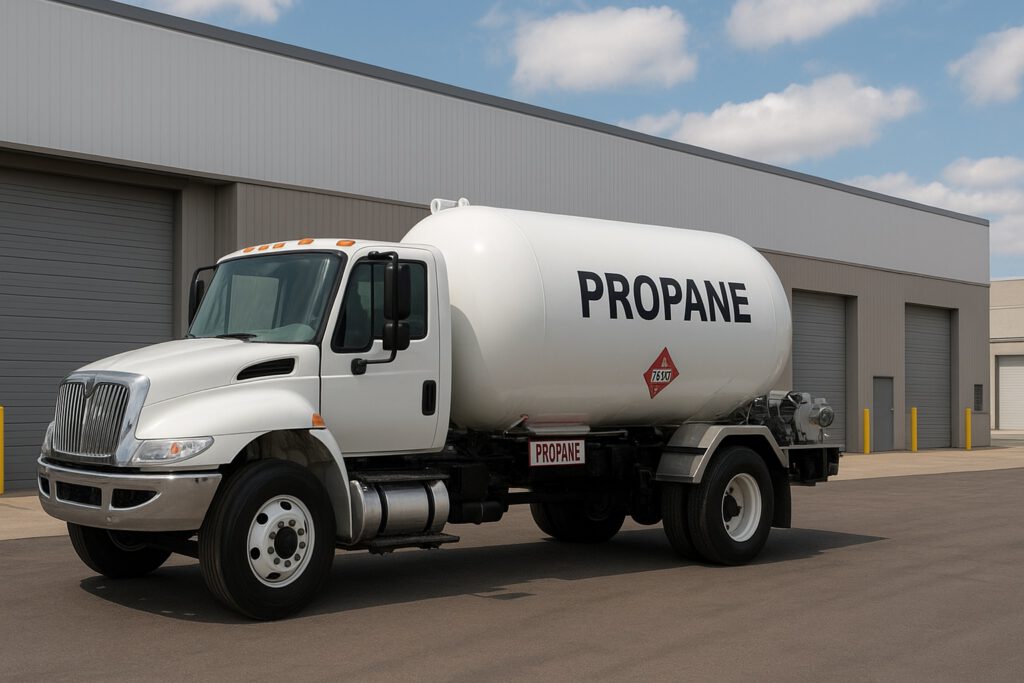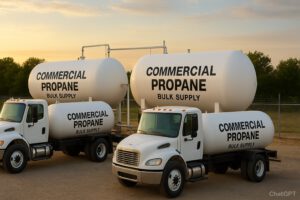
Bulk propane delivery services provide cost-effective, reliable fuel solutions for commercial and industrial operations, offering volume pricing, flexible scheduling, and dedicated support for businesses with high fuel consumption needs.
Understanding bulk delivery options, contract terms, and tank requirements helps businesses optimize their propane supply chain and reduce operational costs through efficient fuel management.
Understanding Bulk Propane Delivery
Bulk propane delivery serves commercial and industrial customers who require large quantities of propane for heating, manufacturing, or operational processes. These services differ significantly from residential delivery in scale, pricing, and service requirements.
What is Bulk Propane Delivery?
Bulk delivery involves transporting large quantities of propane to commercial storage tanks, providing businesses with reliable fuel supply for their operations. This service model is designed for customers who consume more than 1,000 gallons of propane annually.
Key Characteristics
- Large volume supply — Minimum deliveries of 500-1,000 gallons
- Dedicated delivery scheduling — Customized delivery routes and timing
- Commercial pricing — Volume-based discounts and contract rates
- Storage requirements — On-site tank installation and maintenance
Who Needs Bulk Propane Delivery?
Bulk delivery serves various commercial sectors:
Manufacturing and Industrial
- Process heating — Metal working, food processing, chemical manufacturing
- Oven and furnace operations — High-temperature industrial applications
- Power generation — Backup generators and emergency power systems
- Material handling — Forklift and industrial vehicle fleets
Commercial and Hospitality
- Restaurant chains — Commercial kitchen equipment and cooking
- Hotels and resorts — Heating, hot water, and recreational facilities
- Laundromats — Commercial washing and drying operations
- Greenhouses — Agricultural and horticultural heating
Agricultural Operations
- Grain drying — Post-harvest crop processing
- Livestock facilities — Barn heating and ventilation
- Equipment operation — Tractors and agricultural machinery
- Irrigation systems — Pump and water management systems
Bulk Propane Storage Solutions
Commercial Tank Options
Bulk delivery requires appropriate storage infrastructure:
| Tank Type | Capacity | Best For | Installation Cost |
|---|---|---|---|
| 500 Gallon | 500 gallons | Small businesses, restaurants | $3,000-$5,000 |
| 1,000 Gallon | 1,000 gallons | Medium businesses, hotels | $5,000-$8,000 |
| 2,000 Gallon | 2,000 gallons | Large facilities, manufacturing | $8,000-$12,000 |
| 5,000+ Gallon | 5,000+ gallons | Industrial operations | $15,000-$25,000 |
Tank Selection Factors
- Usage volume — Match capacity to consumption patterns
- Delivery frequency — Balance storage with delivery economics
- Site constraints — Consider available space and accessibility
- Future expansion — Plan for potential growth in usage
Tank Installation Requirements
Commercial tank installation involves specific considerations:
Location and Site Preparation
- Foundation requirements — Concrete pad and proper support structure
- Setback distances — Compliance with local fire and building codes
- Accessibility — Delivery truck access and maneuvering space
- Grounding systems — Lightning protection and electrical grounding
Permits and Regulations
- Local building permits — Site preparation and installation approval
- Fire department approval — Safety compliance and inspection
- Environmental permits — Spill prevention and environmental protection
- Zoning compliance — Local land use and zoning requirements
Pricing and Cost Analysis
Bulk Propane Pricing Structure
Commercial pricing differs from residential rates:
Volume-Based Pricing
| Annual Volume | Price per Gallon | Typical Discount | Delivery Fee |
|---|---|---|---|
| 1,000-5,000 gallons | $1.50-$2.00 | 10-20% off retail | $50-$100/delivery |
| 5,000-10,000 gallons | $1.25-$1.75 | 20-30% off retail | $75-$125/delivery |
| 10,000+ gallons | $1.00-$1.50 | 30-40% off retail | $100-$150/delivery |
Pricing Factors
- Market conditions — Propane prices fluctuate seasonally
- Contract terms — Fixed vs. variable pricing agreements
- Volume commitments — Minimum purchase requirements
- Delivery frequency — Impact on transportation costs
Cost Comparison: Bulk vs. Alternatives
Compare bulk propane with other fuel options:
vs. Residential Delivery
- Per-gallon savings — 20-40% lower cost for bulk customers
- Delivery efficiency — Fewer deliveries, lower per-delivery costs
- Service level — Dedicated account management and support
- Contract flexibility — Customized terms for business needs
vs. Other Fuels
- Natural gas — Propane often competitive where natural gas unavailable
- Diesel/LP alternatives — Propane typically 10-20% more expensive
- Electricity — Propane more cost-effective for high-heat applications
- Alternative fuels — Propane offers reliability and availability advantages
Contract Terms and Service Agreements
Commercial Contract Components
Bulk delivery contracts include specific terms:
Core Contract Elements
- Pricing structure — Fixed or indexed pricing arrangements
- Volume commitments — Minimum and maximum purchase requirements
- Delivery scheduling — Regular delivery routes and timing
- Service level agreements — Response times and support commitments
Contract Duration
- Annual agreements — Most common for commercial customers
- Multi-year contracts — Available with volume discounts
- Month-to-month options — For seasonal or variable needs
- Automatic renewal — Terms for contract continuation
Service Level Commitments
Commercial contracts specify service expectations:
Delivery Guarantees
- Scheduled delivery windows — Specific time frames for deliveries
- Emergency delivery — Priority service for urgent needs
- Weather contingencies — Procedures for delivery disruptions
- Minimum inventory levels — Tank level monitoring and alerts
Support Services
- Dedicated account manager — Single point of contact for service
- 24/7 emergency support — Round-the-clock technical assistance
- Equipment maintenance — Tank inspection and repair services
- Usage reporting — Detailed consumption and cost analysis
Delivery Scheduling and Logistics
Delivery Frequency Options
Bulk delivery schedules optimize logistics:
Standard Delivery Patterns
- Weekly deliveries — For high-volume customers (5,000+ gallons/month)
- Bi-weekly deliveries — For medium-volume users (2,000-5,000 gallons/month)
- Monthly deliveries — For lower-volume commercial customers
- On-demand delivery — For variable or seasonal needs
Seasonal Considerations
- Winter heating season — Increased delivery frequency for peak demand
- Summer maintenance — Reduced deliveries during off-peak periods
- Weather impacts — Contingency plans for delivery disruptions
- Inventory management — Maintaining adequate reserve capacity
Delivery Logistics
Efficient delivery requires coordination:
Site Requirements
- Loading area — Safe space for delivery truck operations
- Access routes — Clear paths for truck maneuvering
- Security protocols — Site access and safety procedures
- Communication systems — Contact procedures during delivery
Delivery Process
- Pre-delivery notification — Advance notice of delivery schedule
- On-site coordination — Communication with facility personnel
- Safety protocols — Proper handling and transfer procedures
- Documentation — Delivery tickets and inventory records
Tank Monitoring and Management
Inventory Monitoring Systems
Modern systems provide real-time tank information:
Basic Monitoring
- Manual tank gauges — Visual level indicators
- Delivery tracking — Manual inventory records
- Usage estimation — Based on historical consumption patterns
- Phone notifications — Manual alerts for low levels
Advanced Monitoring
- Automated tank monitors — Real-time level tracking
- Mobile app access — Smartphone tank monitoring
- Email/SMS alerts — Automatic low-level notifications
- Usage analytics — Detailed consumption reporting
Inventory Management Best Practices
Effective inventory control prevents shortages:
Reorder Point Strategy
- Safety stock levels — Minimum reserve capacity requirements
- Lead time consideration — Delivery scheduling and response times
- Usage variability — Accounting for consumption fluctuations
- Seasonal adjustments — Peak demand planning
Management Tools
- Inventory software — Automated tracking and reporting
- Usage forecasting — Predictive consumption modeling
- Supplier communication — Regular coordination with delivery providers
- Performance metrics — Key performance indicators for fuel management
Safety and Compliance Requirements
Commercial Safety Standards
Bulk propane operations require rigorous safety protocols:
Regulatory Compliance
- NFPA 58 standards — National propane safety requirements
- DOT regulations — Transportation and handling standards
- OSHA requirements — Workplace safety and hazard communication
- Local fire codes — Site-specific safety regulations
Safety Systems
- Emergency shut-off systems — Automatic and manual shut-off valves
- Leak detection systems — Monitoring and alarm systems
- Fire suppression equipment — Appropriate extinguishing systems
- Personal protective equipment — Safety gear for handling operations
Emergency Preparedness
Comprehensive emergency planning is essential:
Emergency Response Plans
- Incident response procedures — Step-by-step emergency protocols
- Emergency contact lists — Key personnel and emergency services
- Evacuation procedures — Building and site evacuation plans
- Communication systems — Emergency notification procedures
Training Requirements
- Employee safety training — Propane handling and emergency procedures
- Hazard communication — Proper labeling and safety data sheets
- Equipment operation training — Safe operation of propane systems
- Emergency drill exercises — Regular practice of response procedures
Environmental and Sustainability Considerations
Environmental Impact
Bulk propane operations affect environmental compliance:
Emission Control
- Leak prevention programs — Regular inspection and maintenance
- Spill prevention plans — Containment and response procedures
- Emission monitoring — Tracking and reporting requirements
- Alternative fuel options — Renewable propane and bio-propane
Sustainability Initiatives
- Efficient delivery routing — Optimized transportation to reduce emissions
- Energy-efficient equipment — High-efficiency propane appliances
- Waste reduction — Proper disposal and recycling programs
- Carbon offset programs — Voluntary emission reduction initiatives
Getting Started with Bulk Propane Delivery
Assessment and Planning
Proper planning ensures successful bulk propane implementation:
Initial Assessment
- Usage analysis — Calculate current and projected propane consumption
- Site evaluation — Assess tank installation feasibility and requirements
- Budget planning — Compare costs with current fuel expenses
- Vendor selection — Research and evaluate potential suppliers
Implementation Timeline
- Planning phase — 2-4 weeks for assessment and permitting
- Installation phase — 1-2 weeks for tank and system setup
- Testing phase — 1 week for system verification and training
- Transition phase — Gradual switch to bulk delivery services
Choosing a Bulk Propane Provider
Select providers based on specific business needs:
Selection Criteria
- Industry experience — Track record with similar business types
- Service area coverage — Reliable delivery to your location
- Pricing competitiveness — Volume discounts and contract terms
- Technology capabilities — Monitoring and reporting systems
Contract Negotiation
- Volume commitments — Negotiate realistic minimum purchase requirements
- Pricing structure — Fixed vs. variable rate agreements
- Service level agreements — Define delivery and support expectations
- Termination clauses — Exit terms and conditions
Cost-Benefit Analysis
Financial Considerations
Evaluate the economic impact of bulk delivery:
Cost Savings Analysis
- Volume discounts — 20-40% savings on fuel costs
- Delivery efficiency — Reduced per-delivery transportation costs
- Inventory management — Fewer delivery trips and associated costs
- Contract stability — Predictable pricing and budget planning
Return on Investment
- Payback period — Typically 1-3 years depending on usage volume
- Operational savings — Reduced administrative and handling costs
- Risk reduction — Stable supply and pricing security
- Scalability benefits — Cost advantages grow with usage volume
Risk Assessment
Consider potential challenges and mitigation strategies:
Operational Risks
- Supply reliability — Multiple supplier options and backup plans
- Price volatility — Hedging strategies and contract terms
- Equipment failure — Maintenance contracts and spare parts
- Regulatory changes — Compliance monitoring and legal support
Future Trends and Innovations
Technological Advancements
Innovations are transforming bulk propane delivery:
Digital Solutions
- IoT tank monitoring — Real-time inventory and usage tracking
- Predictive analytics — AI-powered delivery optimization
- Mobile applications — Smartphone-based account management
- Automated ordering — Self-service reordering systems
Sustainable Developments
- Bio-propane options — Renewable propane alternatives
- Emission reduction technologies — Cleaner delivery and storage systems
- Energy efficiency improvements — Higher-efficiency propane appliances
- Carbon-neutral programs — Offset programs for environmental impact
Making the Decision
Bulk propane delivery offers significant advantages for businesses with substantial fuel needs, providing cost savings, reliable supply, and dedicated service. The key to success lies in proper planning, selecting the right provider, and implementing effective management systems.
Consider your usage volume, budget constraints, and operational requirements when evaluating bulk delivery options. Professional consultation can help assess your specific needs and develop a comprehensive propane management strategy.
Ready to explore bulk propane delivery for your business? Contact commercial propane providers for a detailed assessment and customized solution for your fuel needs.
Additional Resources
Learn more about commercial propane solutions:
- National Propane Gas Association — Industry standards and commercial resources
- Propane Education & Research Council — Commercial propane applications
- National Fire Protection Association — Safety standards for bulk propane
- Environmental Protection Agency — Regulations for commercial fuel storage
Always consult licensed professionals and comply with local regulations when implementing bulk propane delivery systems.
About Jennifer Whitaker
Propane industry expert and content contributor for MyPropane.com.
View all posts by Jennifer Whitaker →Related Articles

Commercial Propane Contracts and Bulk Supply: Business Guide
Sep 17, 2025 • 9 min read
Learn about commercial propane contracts with volume pricing, automatic delivery scheduling, and dedicated account management for large-scale operations and bulk…

Propane Warehouse Operations and Tank Monitoring: Complete Guide
Sep 18, 2025 • 7 min read
Optimize warehouse operations with propane-powered forklifts, automated tank monitoring, and efficient fuel management. Learn about cylinder exchange programs and smart…